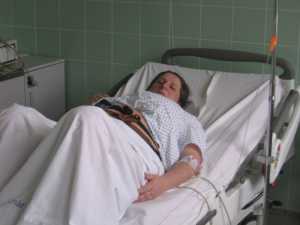MedicalResearch.com Interview with:
 Julia F. van den Berg, PhD
Leiden University, Department of Clinical Psychology
Leiden, The Netherlands
MedicalResearch.com: What is the background for this study? What are the main findings?
Response: Caffeine is the most used psychoactive substance worldwide, mostly consumed via coffee, energy drinks, tea and chocolate. Experimental studies have shown that caffeine can negatively affect sleep quality. The timing of caffeine consumption may play a role; the closer to bedtime, the more caffeine consumption is likely to have a negative effect on sleep. We also wondered if chronotype, being a morning or evening person, would make a difference in the effect of caffeine on sleep.
We sent out questionnaires on sleep quality, chronotype, and a detailed questionnaire on type and timing of caffeine use to 880 secondary education students (mean age 21.3 years). We found that for the entire group, the amount of caffeine per week was not associated with sleep quality, regardless of chronotype. However, when we divided the group into subgroups of students who did, and students who did not usually consume caffeine in the evening (after 6PM), we found something interesting. Only for students who did not consume caffeine in the evening (20% of the total sample), a higher total caffeine consumption per week was associated with poorer sleep, in spite of the fact that these students consumed a lot less caffeine per week than the group who did consume caffeine in the evening.
This suggests a self-regulatory mechanism: students who know they are sensitive to caffeine do not drink it in the evening, nevertheless, the caffeinated beverages they drink during the day do affect their sleep.
(more…)
Julia F. van den Berg, PhD
Leiden University, Department of Clinical Psychology
Leiden, The Netherlands
MedicalResearch.com: What is the background for this study? What are the main findings?
Response: Caffeine is the most used psychoactive substance worldwide, mostly consumed via coffee, energy drinks, tea and chocolate. Experimental studies have shown that caffeine can negatively affect sleep quality. The timing of caffeine consumption may play a role; the closer to bedtime, the more caffeine consumption is likely to have a negative effect on sleep. We also wondered if chronotype, being a morning or evening person, would make a difference in the effect of caffeine on sleep.
We sent out questionnaires on sleep quality, chronotype, and a detailed questionnaire on type and timing of caffeine use to 880 secondary education students (mean age 21.3 years). We found that for the entire group, the amount of caffeine per week was not associated with sleep quality, regardless of chronotype. However, when we divided the group into subgroups of students who did, and students who did not usually consume caffeine in the evening (after 6PM), we found something interesting. Only for students who did not consume caffeine in the evening (20% of the total sample), a higher total caffeine consumption per week was associated with poorer sleep, in spite of the fact that these students consumed a lot less caffeine per week than the group who did consume caffeine in the evening.
This suggests a self-regulatory mechanism: students who know they are sensitive to caffeine do not drink it in the evening, nevertheless, the caffeinated beverages they drink during the day do affect their sleep.
(more…)
 Julia F. van den Berg, PhD
Leiden University, Department of Clinical Psychology
Leiden, The Netherlands
MedicalResearch.com: What is the background for this study? What are the main findings?
Response: Caffeine is the most used psychoactive substance worldwide, mostly consumed via coffee, energy drinks, tea and chocolate. Experimental studies have shown that caffeine can negatively affect sleep quality. The timing of caffeine consumption may play a role; the closer to bedtime, the more caffeine consumption is likely to have a negative effect on sleep. We also wondered if chronotype, being a morning or evening person, would make a difference in the effect of caffeine on sleep.
We sent out questionnaires on sleep quality, chronotype, and a detailed questionnaire on type and timing of caffeine use to 880 secondary education students (mean age 21.3 years). We found that for the entire group, the amount of caffeine per week was not associated with sleep quality, regardless of chronotype. However, when we divided the group into subgroups of students who did, and students who did not usually consume caffeine in the evening (after 6PM), we found something interesting. Only for students who did not consume caffeine in the evening (20% of the total sample), a higher total caffeine consumption per week was associated with poorer sleep, in spite of the fact that these students consumed a lot less caffeine per week than the group who did consume caffeine in the evening.
This suggests a self-regulatory mechanism: students who know they are sensitive to caffeine do not drink it in the evening, nevertheless, the caffeinated beverages they drink during the day do affect their sleep.
(more…)
Julia F. van den Berg, PhD
Leiden University, Department of Clinical Psychology
Leiden, The Netherlands
MedicalResearch.com: What is the background for this study? What are the main findings?
Response: Caffeine is the most used psychoactive substance worldwide, mostly consumed via coffee, energy drinks, tea and chocolate. Experimental studies have shown that caffeine can negatively affect sleep quality. The timing of caffeine consumption may play a role; the closer to bedtime, the more caffeine consumption is likely to have a negative effect on sleep. We also wondered if chronotype, being a morning or evening person, would make a difference in the effect of caffeine on sleep.
We sent out questionnaires on sleep quality, chronotype, and a detailed questionnaire on type and timing of caffeine use to 880 secondary education students (mean age 21.3 years). We found that for the entire group, the amount of caffeine per week was not associated with sleep quality, regardless of chronotype. However, when we divided the group into subgroups of students who did, and students who did not usually consume caffeine in the evening (after 6PM), we found something interesting. Only for students who did not consume caffeine in the evening (20% of the total sample), a higher total caffeine consumption per week was associated with poorer sleep, in spite of the fact that these students consumed a lot less caffeine per week than the group who did consume caffeine in the evening.
This suggests a self-regulatory mechanism: students who know they are sensitive to caffeine do not drink it in the evening, nevertheless, the caffeinated beverages they drink during the day do affect their sleep.
(more…)




